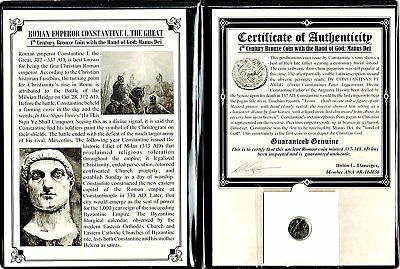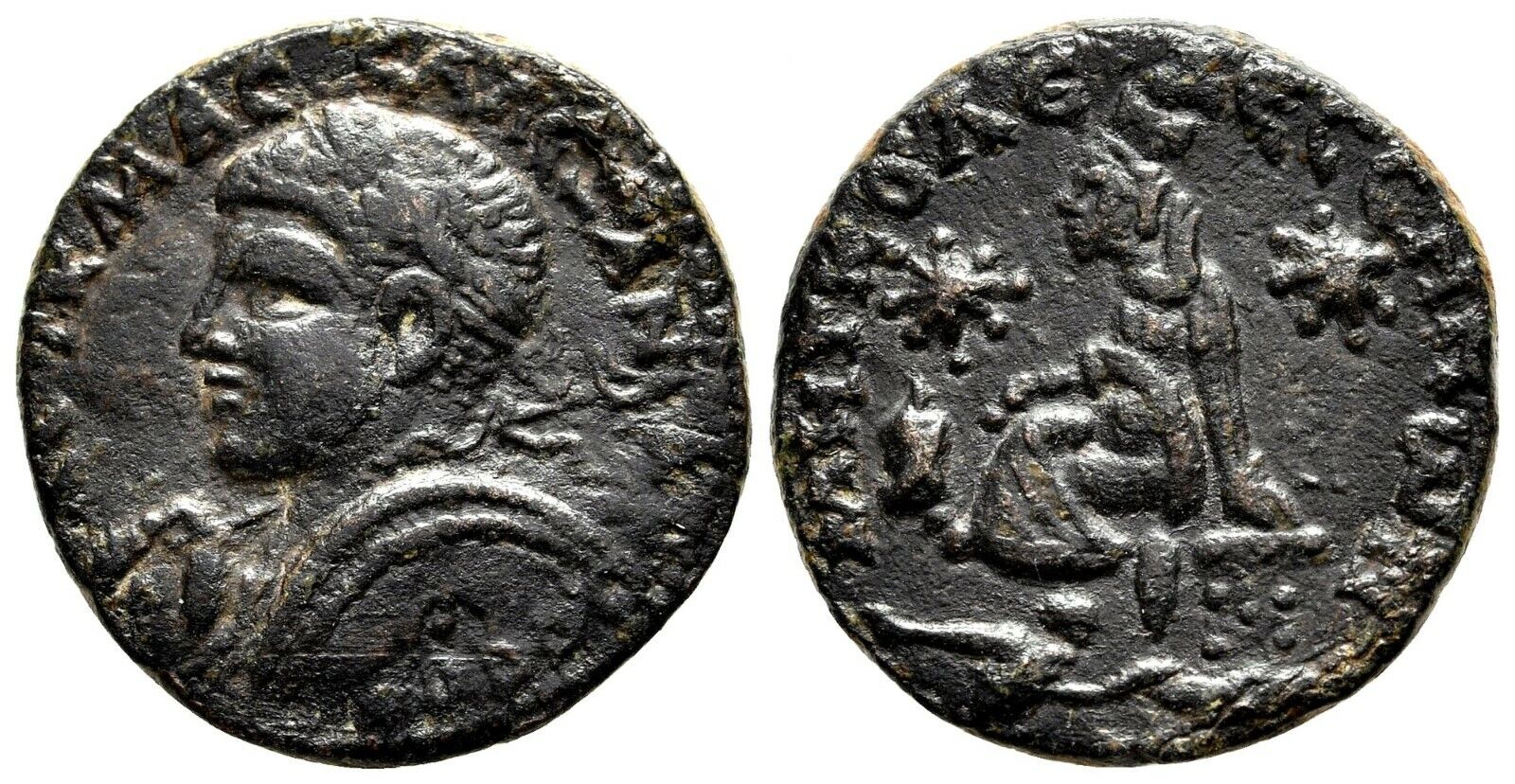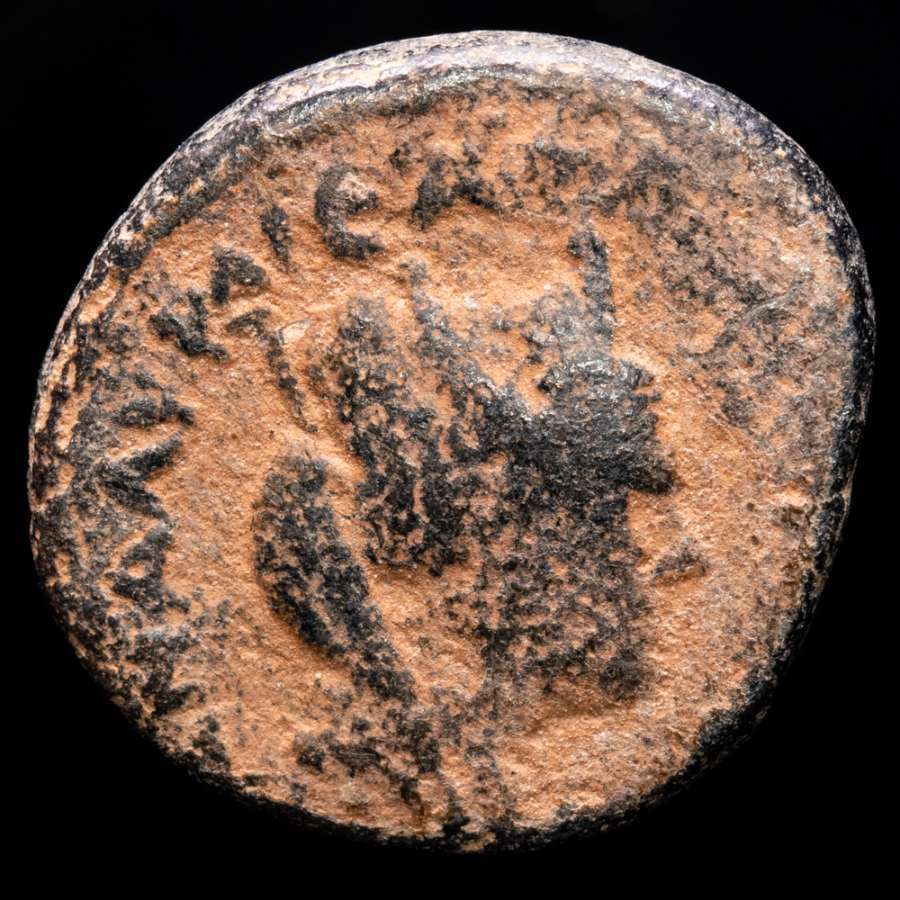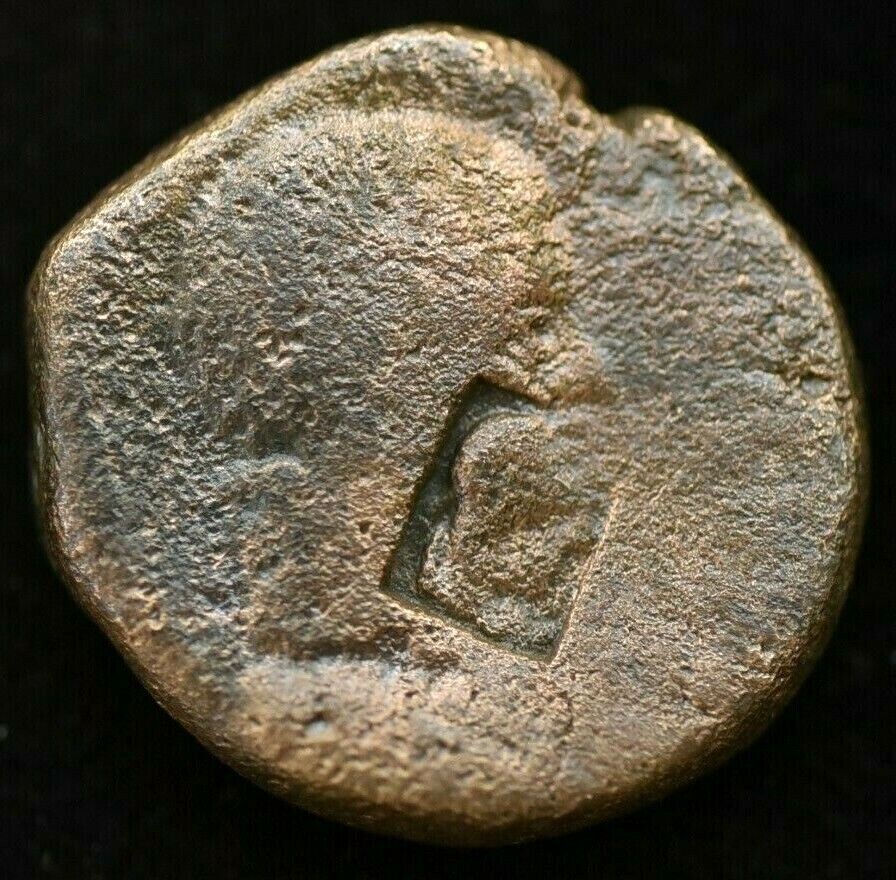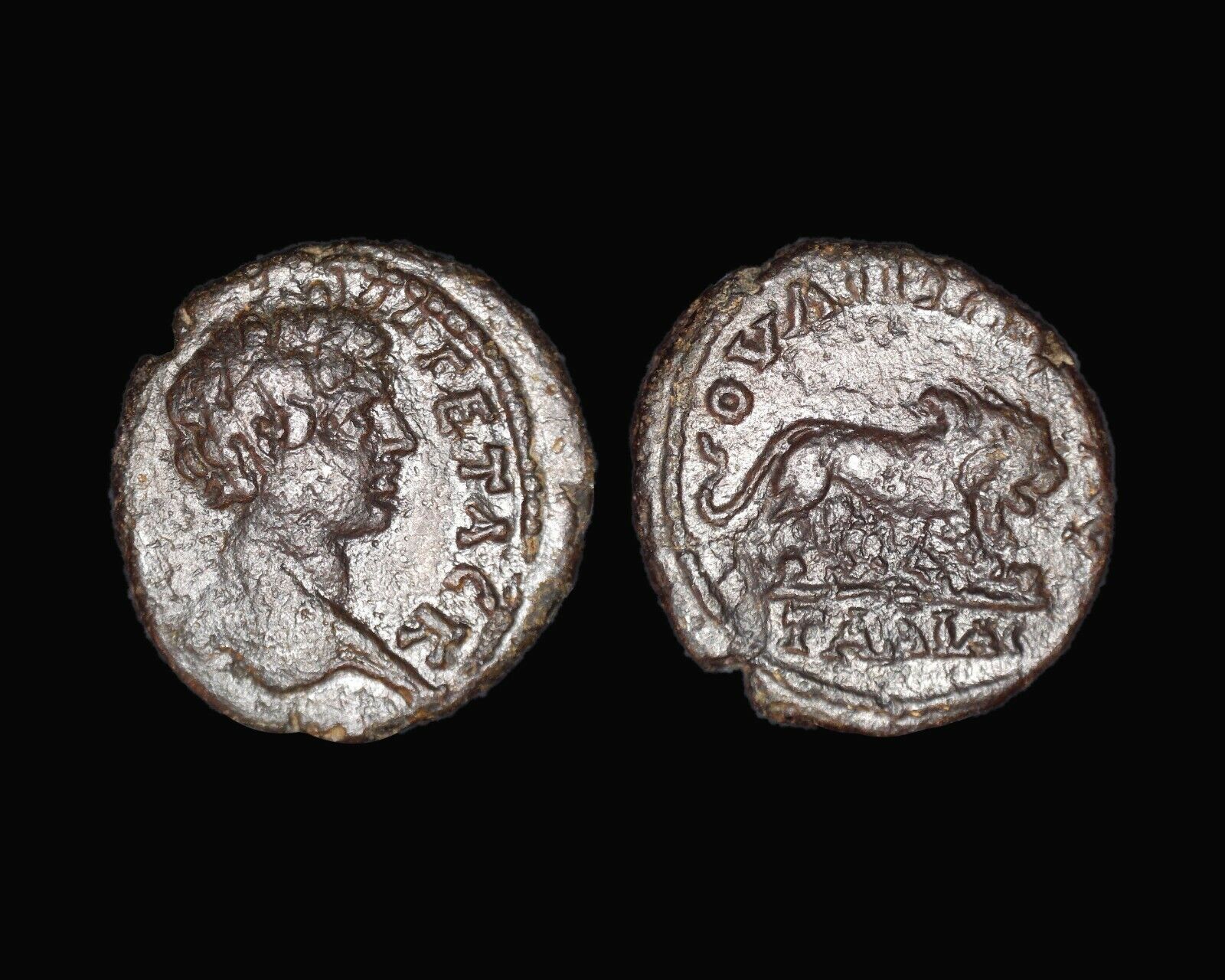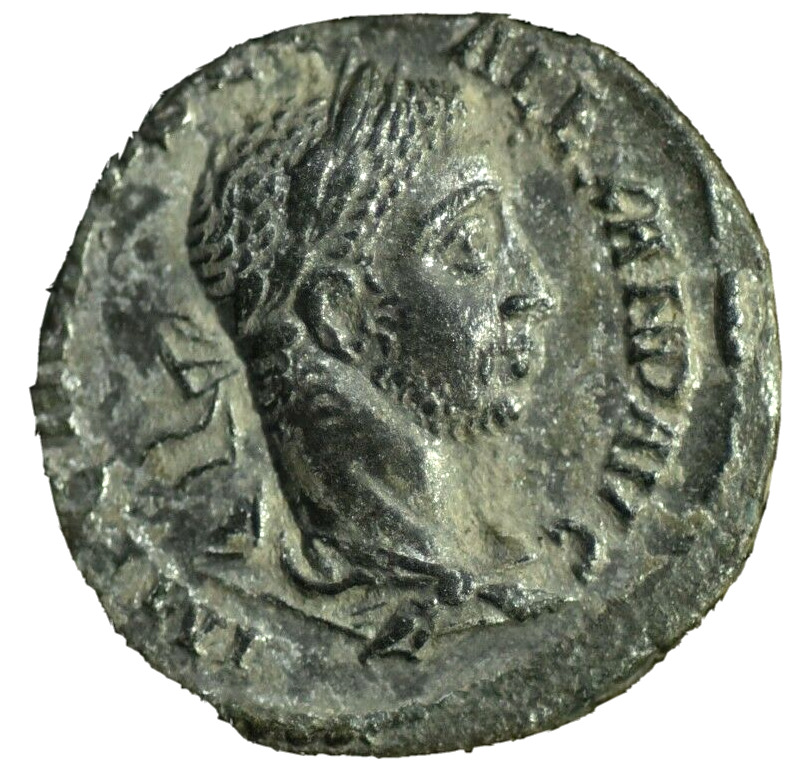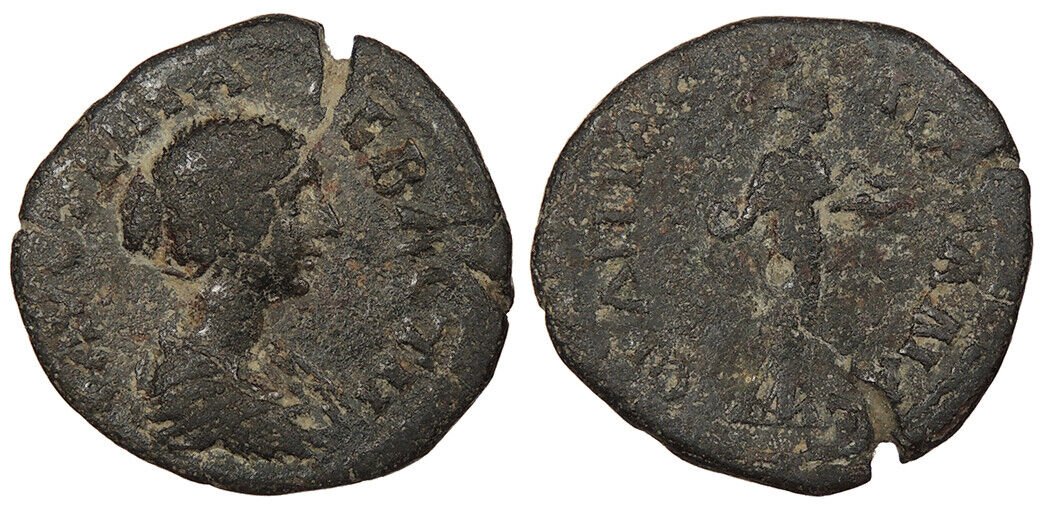-40%
PHILIP I the ARAB 244AD Pella Macedonia Authentic Ancient Roman Coin RARE i57579
$ 89.76
- Description
- Size Guide
Description
Item:i57579
Authentic Ancient Coin of:
<="" font="" face="Times New Roman">
<="" font="" color="#000000"> Philip I ="">
="">
'the Arab' - Roman Emperor: 244-249 A.D. -
Bronze 24mm (7.30 grams) of Pella in Macedonia
Laureate, draped and cuirassed bust right.
City-goddess (Tyche) seated left.
* Numismatic Note: It looks like the celator making the dies for the striking of this coin was actually of Roman decent, and likely did not read Greek, as the legend is a blunder switching between Latin and Greek inscriptions. Very interesting and extraordinarily rare coin.
<="" font="" face="Times New Roman">
You are bidding on the exact item pictured, provided with a Certificate of Authenticity and Lifetime Guarantee of Authenticity.
Tyche (Greek for luck; the Roman equivalent was
Fortuna
) was the presiding
tutelary deity
that governed the fortune and prosperity of a city, its destiny. Increasingly during the Hellenistic period, cities had their own specific iconic version of Tyche, wearing a
mural crown
(a crown like the walls of the city).
The Greek historian
Polybius
believed that when no cause can be discovered to events such as floods, droughts, frosts or even in politics, then the cause of these events may be fairly attributed to Tyche.
Stylianos Spyridakis concisely expressed Tyche's appeal in a Hellenistic world of arbitrary violence and unmeaning reverses: "In the turbulent years of the
Epigoni of Alexander
, an awareness of the instability of human affairs led people to believe that Tyche, the blind mistress of Fortune, governed mankind with an inconstancy which explained the vicissitudes of the time."
In literature, she might be given various genealogies, as a daughter of
Hermes
and
Aphrodite
, or considered as one of the
Oceanids
, daughters of
Oceanus
and
Tethys
, or of
Zeus
. She was connected with
Nemesis
and
Agathos Daimon
("good spirit").
She was uniquely venerated at
Itanos
in Crete, as
Tyche Protogeneia
, linked with the Athenian
Protogeneia
("firstborn"), daughter of
Erechtheus
, whose self-sacrifice saved the city.
She had temples at
Caesarea Maritima
,
Antioch
,
Alexandria
and
Constantinople
. In
Alexandria
the
Tychaeon
, the temple of Tyche, was described by
Libanius
as one of the most magnificent of the entire Hellenistic world.
Tyche appears on many
coins
of the Hellenistic period in the three centuries before the Christian era, especially from cities in the Aegean. Unpredictable turns of fortune drive the complicated plotlines of
Hellenistic romances
, such as
Leucippe and Clitophon
or
Daphnis and Chloe
. She experienced a resurgence in another era of uneasy change, the final days of publicly sanctioned
Paganism
, between the late-fourth-century emperors
Julian
and
Theodosius I
who definitively closed the temples. The effectiveness of her capricious power even achieved respectability in philosophical circles during that generation, though among poets it was a commonplace to revile her for a fickle harlot.
In
medieval art
, she was depicted as carrying a
cornucopia
, an
emblematic
ship's rudder, and the
wheel of fortune
, or she may stand on the wheel, presiding over the entire circle of fate.
The constellation of
Virgo
is sometimes identified as the heavenly figure of Tyche, as well as other goddesses such as
Demeter
and
Astraea
.
Pella
, an ancient city located in
Pella Prefecture
of
Macedonia
in
Greece
, was the
capital
of the
ancient
kingdom
of
Macedon
. A common
folk etymology
is traditionally given for the name
Pella
, ascribing it to a form akin to the
Doric
Apella
, originally meaning a ceremonial location where decisions were made. However, the local form of Greek was not Doric, and the word exactly matches standard Greek
pélla
"stone", undoubtedly referring to a famous landmark from the time of its foundation.
The city was founded by Archelaus I of Macedon (413–399 BC) as the capital of his kingdom, replacing the older palace-city of Aigai (Vergina). After this, it was the seat of King Philip II of Macedon and of Alexander the Great, his son. In 168 BC, it was sacked by the Romans, and its treasury transported to Rome. Later, the city was destroyed by an earthquake and eventually was rebuilt over its ruins. By 180 AD, Lucian could describe it in passing as "now insignificant, with very few inhabitants".
<="" span="">
Marcus Julius Philippus
or
Philippus I Arabs
(c. 204–249), known in
English
as
Philip the Arab
or formerly (prior to World War II) in English as
Philip the Arabian
, was a
Roman Emperor
from 244 to 249.
//
Little is known about Philip's early life and political career. He was born in
Shahba
, about 55 miles southeast of
Damascus
, in the
Roman province
of
Syria
. Philip has the nickname "the Arab" because he had family who had originated in the
Arabian peninsula
, believed to be distant descendants of the prestigious Baleed family of
Aleppo
. Philip was the son of a Julius Marinus, a local Roman citizen, possibly of some importance. Many historians agree that he was of Arab descent who gained
Roman citizenship
through his father, a man of considerable influence. Many citizens from the provinces took Roman names upon acquiring citizenship. This makes tracing his Arabic blood line difficult. However, it is documented that Rome used the
Ghassan
tribe from the
Azd
of
Yemen
as vassals to keep the neighboring northern Arabs in check.
The name of Philip's mother is unknown, but sources refer to a brother,
Gaius Julius Priscus
, a member of the
Praetorian guard
under
Gordian III
(238–244). In 234, Philip married
Marcia Otacilia Severa
, daughter of a Roman Governor. They had two children: a son named Marcus Julius Philippus Severus (
Philippus II
) in 238 and according to numismatic evidence they had a daughter called Julia Severa or Severina, whom the ancient Roman sources don't mention.
Philip became a member of the
Pretorian Guard
during the reign of the emperor
Alexander Severus
, who was a Syrian. In ancient Rome the Pretorian Guard was closely associated with the emperor, serving among other things as the emperor's bodyguard.
Political career
In 243, during
Gordian III
's campaign against
Shapur I
of Persia, the
Praetorian prefect
Timesitheus
died under unclear circumstances. At the suggestion of his brother Priscus, Philip became the new Praetorian prefect, with the intention that the two brothers would control the young Emperor and rule the Roman world as unofficial regents. Following a military defeat, Gordian III died in 244 under circumstances that are still debated. While some claim that Philip conspired in his murder, other accounts (including one coming from the Persian point of view) state that Gordian died in battle. Whatever the case, Philip assumed the purple following Gordian's death. According to Edward Gibbon:
His rise from so obscure a station to the first dignities of the empire seems to prove that he was a bold and able leader. But his boldness prompted him to aspire to the throne, and his abilities were employed to supplant, not to serve, his indulgent master.
Philip was not willing to repeat the mistakes of previous claimants, and was aware that he had to return to
Rome
in order to secure his position with the
senate
. He thus travelled west, after concluding a peace treaty with Shapur I, and left his brother Priscus as extraordinary ruler of the Eastern provinces. In Rome he was confirmed
Augustus
, and nominated his young son
Caesar
and heir.
Philip's rule started with yet another
Germanic
incursion on the provinces of
Pannonia
and the
Goths
invaded
Moesia
(modern-day
Serbia
and
Bulgaria
) in the
Danube
frontier. They were finally defeated in the year 248, but the
legions
were not satisfied with the result, probably due to a low share of the plunder, if any. Rebellion soon arose and
Tiberius Claudius Pacatianus
was proclaimed emperor by the troops. The uprising was crushed and Philip nominated
Gaius Messius Quintus Decius
as governor of the province. Future events would prove this to be a mistake. Pacatianus' revolt was not the only threat to his rule: in the East,
Marcus Jotapianus
led another uprising in response to the oppressive rule of
Priscus
and the excessive taxation of the Eastern provinces. Two other usurpers,
Marcus Silbannacus
and
Sponsianus
, are reported to have started rebellions without much success.
In April
A.D.
248 (April 1000
A.U.C.
), Philip had the honour of leading the celebrations of the one thousandth birthday of Rome, which according to tradition was
founded
in 753 BC by
Romulus
. He combined the anniversary with the celebration of Rome's alleged tenth
saeculum
. According to contemporary accounts, the festivities were magnificent and included spectacular games,
ludi saeculares
, and theatrical presentations throughout the city. In the coliseum, more than 1,000 gladiators were killed along with hundreds of exotic animals including hippos, leopards, lions, giraffes, and one rhinoceros. The events were also celebrated in literature, with several publications, including
Asinius Quadratus
's
History of a Thousand Years
, specially prepared for the anniversary.
Despite the festive atmosphere, discontent in the legions was growing.
Decius
(249–251) was proclaimed Emperor by the Danubian armies in the spring of 249 and immediately marched to Rome. Philip's army met the usurper near modern
Verona
that summer. Decius won the battle and Philip was killed sometime in September 249, either in the fighting or assassinated by his own soldiers who were eager to please the new ruler. Philip's eleven-year-old son and heir may have been killed with his father and Priscus disappeared without a trace.
Religious beliefs
Further information:
Philip the Arab and Christianity
Some later traditions, first mentioned in the historian
Eusebius
in his
Ecclesiastical History
, held that Philip was the first
Christian
Roman emperor. This tradition seems to be based on reports in Eusebius that Philip allegedly had once entered a Christian service on Easter, after having been required by a bishop to confess his sins. Later versions located this event in Antioch.
However, historians generally identify the later Emperor Constantine, baptised on his deathbed, as the first Christian emperor, and generally describe Philip's adherence to Christianity as dubious, because non-Christian writers do not mention the fact, and because throughout his reign, Philip to all appearances (coinage, etc.) continued to follow the
state religion
. Critics ascribe Eusebius' claim as probably due to the tolerance Philip showed towards Christians.
Saint Quirinus of Rome
was, according to a legendary account, the son of Philip the Arab.
Frequently Asked Questions
How long until my order is shipped?
Depending on the volume of sales, it may take up to 5 business days for shipment of your order after the receipt of payment.
How will I know when the order was shipped?
After your order has shipped, you will be left positive feedback, and that date should be used as a basis of estimating an arrival date.
After you shipped the order, how long will the mail take?
USPS First Class mail takes about 3-5 business days to arrive in the U.S., international shipping times cannot be estimated as they vary from country to country. I am not responsible for any USPS delivery delays, especially for an international package.
What is a certificate of authenticity and what guarantees do you give that the item is authentic?
Each of the items sold here, is provided with a Certificate of Authenticity, and a Lifetime Guarantee of Authenticity, issued by a world-renowned numismatic and antique expert that has identified over 10000 ancient coins and has provided them with the same guarantee. You will be quite happy with what you get with the COA; a professional presentation of the coin, with all of the relevant information and a picture of the coin you saw in the listing.
Compared to other certification companies, the certificate of authenticity is a -50 value. So buy a coin today and own a piece of history, guaranteed.
Is there a money back guarantee?
I offer a 30 day unconditional money back guarantee. I stand behind my coins and would be willing to exchange your order for either store credit towards other coins, or refund, minus shipping expenses, within 30 days from the receipt of your order. My goal is to have the returning customers for a lifetime, and I am so sure in my coins, their authenticity, numismatic value and beauty, I can offer such a guarantee.
Is there a number I can call you with questions about my order?
You can contact me directly via ask seller a question and request my telephone number, or go to my About Me Page to get my contact information only in regards to items purchased on eBay.
When should I leave feedback?
Once you receive your order, please leave a positive. Please don't leave any negative feedbacks, as it happens many times that people rush to leave feedback before letting sufficient time for the order to arrive. Also, if you sent an email, make sure to check for my reply in your messages before claiming that you didn't receive a response. The matter of fact is that any issues can be resolved, as reputation is most important to me. My goal is to provide superior products and quality of service.
="">="">



